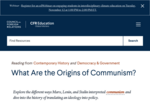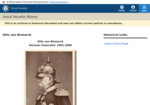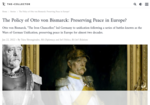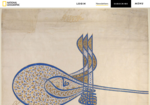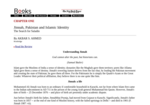Unification of Italy
Communist Manifesto
Unification of Germany
Ottoman Empire
India & Pakistan
More than anybody else, it was Giuseppe Garibaldi who eventually managed to get these two apparently irreconcilable forces, Piedmontese expansionism and progressive republicanism, to work together, however uneasily.
Website name is The History Place --- no editors or publisher are listed (or needed)
With the slogan “a million men with a million guns,” Garibaldi began a furious recruiting campaign aimed at pulling together an army of liberation.
Discussion notes the ideal definition of communism along with its origins and adaptations
"Communism is based on the goal of eliminating socioeconomic class struggles by creating a classless society in which everyone shares the benefits of labor and the state controls all property and wealth."
Friederich Engels' father was a German manufacturer and Engels worked as his agent in his father's Manchester factory. As a result he combined both real experience of the city, with a strong social conscience. The result was his ~ The Condition of the Working-Class in England in 1844.
Very difficult to cite correctly! Publication date not available. Author/editor not available. Website name: Modernism --- created by a university professor but no links to other resources.
Engels had experienced the nature of the factory system from a young age. He observed the living conditions of the city’s working class, which he described as being worse than that of animals.
The condition of the working-class is the real basis and point of departure of all social movements of the present because it is the highest and most unconcealed pinnacle of the social misery existing in our day.
The condition of the working-class is the real basis and point of departure of all social movements of the present because it is the highest and most unconcealed pinnacle of the social misery existing in our day.
"Explore the different ways Marx, Lenin, and Stalin interpreted communism and dive into the history of translating an ideology into policy."
"The theoretical conclusions of the Communists are in no way based on ideas or principles that have been invented, or discovered, by this or that would-be universal reformer. They merely express, in general terms, actual relations springing from an existing class struggle, from a historical movement going on under our very eyes."
Germany became a modern, unified nation under the leadership of the “Iron Chancellor” Otto von Bismarck (1815-1898), who between 1862 and 1890 effectively ruled first Prussia and then all of Germany.
As a Prussian politician, Otto von Bismarck transformed a collection of small German states into the German empire, his style of rule later gaining him the nickname the ‘Iron Chancellor’.
As 'chancellor' of the new Germany, Bismarck concentrated on building a powerful state with a unified national identity. His targets included the Catholic Church and the spread of socialism.
The creation of the modern unified German state in January 1871 constitutes the greatest diplomatic and political achievement of any leader of the last two centuries; but it was effected at a huge personal and political price.
Bismarck was determined to undermine a party that he saw as a danger to the volatile new nation state. So the Iron Chancellor devised a plan to beat the socialists at their own game by offering health insurance to the working class.
Bismarck was motivated to introduce social insurance in Germany both in order to promote the well-being of workers in order to keep the German economy operating at maximum efficiency, and to stave-off calls for more radical socialist alternatives.
Otto von Bismarck, "The Iron Chancellor,” led Germany to unification following a series of battles known as the Wars of German Unification, preserving peace in Europe for almost two decades.
Though the Ottoman Empire persisted for 600 years, it succumbed to what most historians describe as a long, slow decline, despite efforts to modernize.
It would take a world war to end the Ottoman Empire for good... More than two thirds of the Ottoman military became casualties during World War I, and up to 3 million civilians died.
This is a teaching guide for the fall of the Ottoman Empire. Links and embedded materials may be useful.
Jinnah presented his proposal in the form of Fourteen Points, insisting that no scheme for the future constitution of the government of India will be satisfactory to the Muslims until and unless stipulations were made to safe guard their interests.
Although faced with the challenge of uniting a vast population diverse in culture, language and religion, he successfully established various economic, social and educational reforms that earned him the respect and admiration of millions
In essence, Nehru's goals were uncomplicated. ...He tried to accelerate the historical processes: to achieve within the space of decades what had taken other nations centuries; to modernise a feudal society; to industrialise a rural country; and to mould a fragmented quilt of princely states into a 20th century nation state.
Being a firm believer in the principle of non-alignment, Nehru was naturally shocked ..... Emphasising that the country's defence depended more on its morale than on weapons, he made out a case for resolving contentious issues between India and Pakistan ...
Website: PBS -- In August 1947, Jawaharlal Nehru assumed the role of ... the first prime minister of a newly independent India. The approach Nehru articulated grew out of his view of the modem world and his belief in its technology, combined with his confrontation with the realities of Indian society
Islam gave the Muslims of India a sense of identity; dynasties like the Mughals gave them territory; poets like Allama Iqbal gave them a sense of destiny. Jinnah's towering stature derives from the fact that, by leading the Pakistan movement and creating the state of Pakistan, he gave them all three. For the Pakistanis he is simply the Quaid-i-Azam or the Great Leader.
The All India Muslim League and its leader Muhammad Ali Jinnah drove the campaign to establish the Muslim nation of Pakistan. Historian Ian Talbot charts the development of the League from its founding in 1906 to its legacy after Partition.
Quaid-i-Azam Muhammad Ali Jinnah's achievement as the founder of Pakistan, dominates everything else he did in his long and crowded public life spanning some 42 years. Yet, by any standard, his was an eventful life, his personality multidimensional and his achievements in other fields were many, if not equally great.
Mohammad Ali Jinnah, the founder of Pakistan, sought to create a democratic, egalitarian and secular country where the Muslims of the subcontinent, who constituted about 25% of the population, could enjoy full equality.










